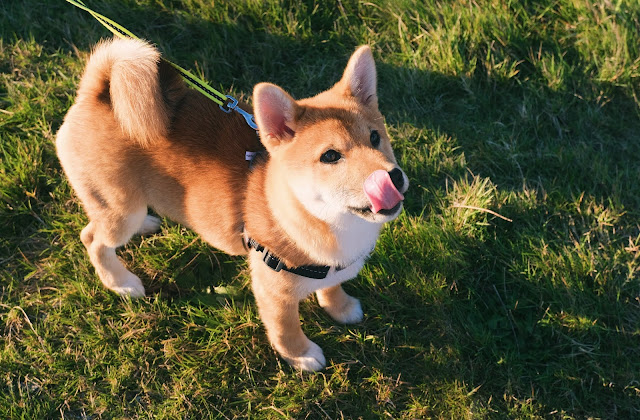Key Points
- Occasional paw licking is normal.
- Licking one paw may indicate a sudden injury.
- Allergies and parasites can cause itchy paws and aggressive licking.
 |
| Why Does My Dog Lick His Paws? |
As with other dog behaviors, there are often several reasons that lead dogs to lick or chew their paws. These include injuries; skin problems; environmental, parasite, or food allergies; and tedium or anxiety.
Occasional paw licking is normal for dogs as a neighborhood of their self-grooming process, especially once they come inside after walking on dirty or sandy ground. But if your dog frequently and intensely licks his paws, you'll assume that something is wrong.
-Injuries:
The first step to require, especially if the licking begins very suddenly and is concentrated on one paw, is to look at the paws to form certain there's not an injury like a cut, torn nail, growth, or perhaps a stone, thorn, or ice ball stuck between the pads. Look closely at the nails, between the toes and pads, and at the tops of the feet.
Your dog may have irritated his paw by stepping on something sharp, walking on salted or hot sidewalks, being stung by a bee, or getting a blister. a number of these problems are often relieved by an easy-care treatment, while others might require treatment by a veterinarian.
-Dermatitis:
If the paw pads and feet appear normal, the licking might be thanks to a skin condition (dermatitis), which frequently is that the results of bacterial problems, allergies, or food sensitivities. Your dog could develop dermatitis by being allergic to chemicals utilized in your yard, deicing products, or certain sorts of grass or weeds. Keeping a bowl of water and a towel near the door to softly clean off the paws once you come inside could help.
-Parasites:
Parasite infections like fleas or mange can cause the paws to be very itchy. Your veterinarian can recommend treatments to eliminate the parasites, which should relieve the itching.
-Food Allergies:
Food allergies are known to cause itchy paws, and these sorts of allergies are difficult to pinpoint. Your vet may suggest a special diet or elimination of certain ingredients in your dog’s food to undertake to alleviate the matter.
-Pain:
Finally, a dog that's experiencing pain thanks to arthritis or other foot or leg conditions may lick its paws. albeit the pain is elsewhere in their body, some dogs will attempt to affect it by licking a front paw continuously. this needs diagnosis and treatment by a veterinarian.
-Behavioral Issues:
If you and your veterinarian have ruled out all of the above problems then your dog could also be affected by boredom or a behavioral problem like anxiety. Again, this is often difficult to diagnose, but there are some steps you'll fancy help. Some dogs develop compulsive behaviors, which include paw licking.
To alleviate boredom, try taking your dog for more walks, runs, or playtime with you and with other dogs to spend more mental and physical energy. Give him puzzle toys or safe chew toys to require his focus faraway from his paws.
If you think that anxiety, like fear of noises or separation anxiety, could also be causing him to lick his paws, there are a variety of the way you'll plan to relieve the anxiety. an honest animal behaviorist can suggest a spread of options to undertake.
-Secondary Infections:
It’s important to acknowledge that licking behavior is often indicative of ill health or may become harmful to the dog. you ought to work together with your veterinarian to work out the cause and find an appropriate solution. Don’t wait too long to try to do this, because the moisture of constant foot licking can cause a secondary bacterial or yeast infection – causing even more itching, redness, swelling, and licking.
Meanwhile, counting on the underlying explanation for the matter, the veterinarian may relieve your dog’s itching by prescribing topical anti-itch sprays, steroids to scale back inflammation, antibiotics for a bacterial infection, or antifungals for yeast infections. the earlier you'll address the matter and illuminate the cause, the better.






0 comments:
Enregistrer un commentaire